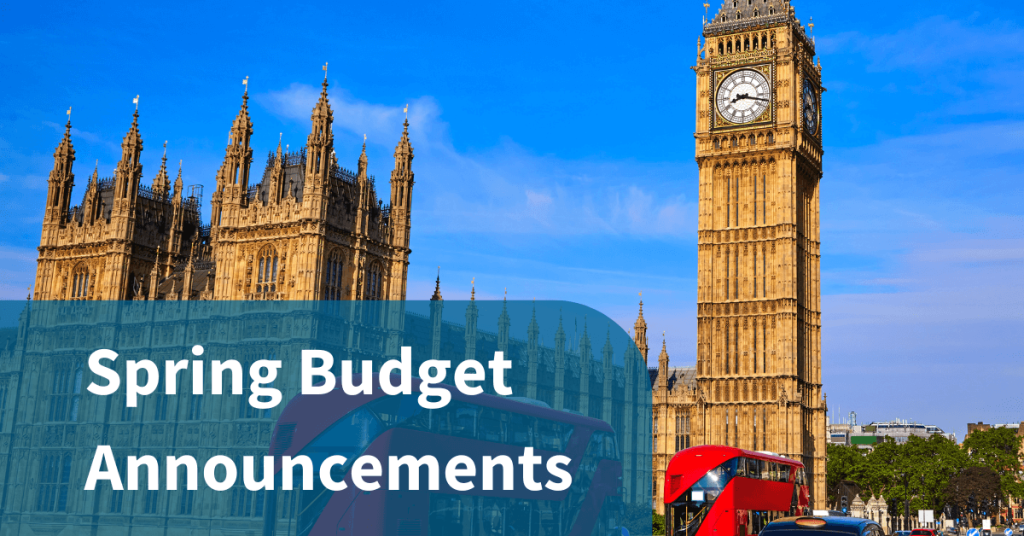
Spring Budget 2024 Announcements
The Spring Budget 2024 announcements are out. Today on 6th March 2024, the Chancellor’s budget speech took place, and we’re sharing what employers need to know, with many updates from Jeremy Hunt, including a further 2% NI cut.
The main focus was on being a Budget of Growth, and while the chambers became unruly at many points, some big announcements received mixed reactions from businesses, the government, and public.
Jeremy Hunt Comments on “Growth Budget”
Jeremy pledged to help families not just with temporary cost-of-living support but with “permanent tax cuts” that would provide much-needed help in challenging times.
“Lower taxes means higher growth”
There was a focus on raising wages and living standards for families with more investment, better jobs and lower taxes, creating a “high wage, high skill economy” with a higher GDP per head.
The budget was costed with the focus on providing cuts without increasing debt as Mr Hunt acknowledged that “There is nothing compassionate about running out of money”.
Fiscal Update
Inflation is expected to fall below the 2% target the government set in “just a few months time”, down from 4% in January. “Nearly a whole year earlier than forecast in the autumn statement,” Jeremy adds.
Business investment has reportedly risen from 9.3 under Labour to 9.9 of GDP under the conservatives, rising to 10.6 of GDP this year which the government claims is generating £30bn more in business investment compared to under the last government.


Spring Budget 2024 Announcement Summary for Employers
2p National Insurance Tax Cuts (NI)
The government plans to unleash “People Power” by making work pay, with the aim of further rewarding work and reducing the penalty on working people.
When will the 2% National Insurance Cuts come into effect? On April 6th the NI cuts will take NICs from 10% to 8% and for self-employed workers this will go for 8% to 6%.
The average worker will see a saving of £450 as a result, and £900 per year as a result of the total cuts since the Autumn Statement 2023, equating to 27 million employees.
This is expected to increase the working population by 200,000 workers and increase 0.4% GDP per head. This is cited to be the “Lowest effective tax rate since 1975”, lower than any G7 country and increases innovation and dynamism.
This will be funded partially by an extra tax on vaping from 2026, but a financial incentive compared to smoking will also be maintained. Extra taxation on property and abolishing the holiday letting regime, along with other measures, will also be implemented.
Get Support from UK Payroll Services Provider Talk Staff
Tax Thresholds?
Unfortunately, while it was sought after, we didn’t see a change in the Personal Tax Allowance, with rates remaining in England, Wales, and Northern Ireland at 20% basic income tax on earnings over £12,571, the higher 40% rate over £50,271, and 45% on earnings over £125,140. Those thresholds are expected to remain frozen until 2028.
Growth Guarantee Scheme (GGS)
The Recovery Loan Scheme (RLS) for small businesses, conceived during the pandemic, is to be extended and renamed the Growth Guarantee Scheme.
Like many, we hope that the Growth Guarantee Scheme will continue to help businesses grow, resulting in more jobs, higher-skilled people, and plenty of opportunity for all.
Staff Shortages Addressed through Childcare Reforms
There are reportedly 900,000 job vacancies that need to be filled and the government acknowledges they want to overcome it with Jeremy Hunt saying “Those who can work should…” with that in mind 2 measures aimed at parents have been introduced.
1. Childcare
The already announced plans to fund free childcare hours for parents of children aged 9 months and over will continue for the next 2 years. This is expected to mean 60,000 more parents will enter the workforce in the next 4 years.
2. Child Benefit System Reform
The system is being reformed to remove the single-parent wealth penalty and make it fairer. The government are introducing a household-based system by 2026.
Two quicker changes are included from this April. The high-income threshold will be raised from £50-60K. This will take 170,000 parents out of paying the child benefit change together. Half a million will save 1,300 next year as a result.
This change is expected to increase the hours worked by existing workers by such an amount that it’s equivalent to 10,000 people entering the workforce.
What is a child benefit charge? The HICBC is a tax charge designed to claw back child benefit where you or your partner has an adjusted net income of more than £50,000
An increase in hours is the equivalent of 10,000 people entering the workforce.
Other Spring Budget 2024 Non-Work-Related Announcements:
- Household support fund – Continues at current levels for another 6 months
- Frozen alcohol duty – Extended until Feb 2025, benefits 38,000 pubs.
- Fuel duty – Maintain 5p cut and freeze fuel duty for another 12 months
- Tech innovation – Unlock more pension fund capital and encourage investment
- Savers – New British ISA with additional £5K.
- Nuclear – New investment to vastly reduce nuclear energy by 2050.
- Creative Industries – Extra investment to support this sector and tourism
- Life Sciences – £650 million investment
- NHS – Investment in digital transformation unlocking huge efficiency savings.
- Special education need provision – 105 million in building special free schools.
- Threshold for business VAT –£85,000 to £90,000 from April 1st
- Non-Dom system – Replaced with ‘modern residency system’
We’ll continue to update this blog over the coming days as additional detail is published and further announcements come to light.
Please note that the information in this blog was created based on the integrity of reputable links at the time of publishing. These blogs should be used for guidance only, you should always check information further before taking action as sources may update over time. Talk Staff holds no responsibility for implementation or loss





